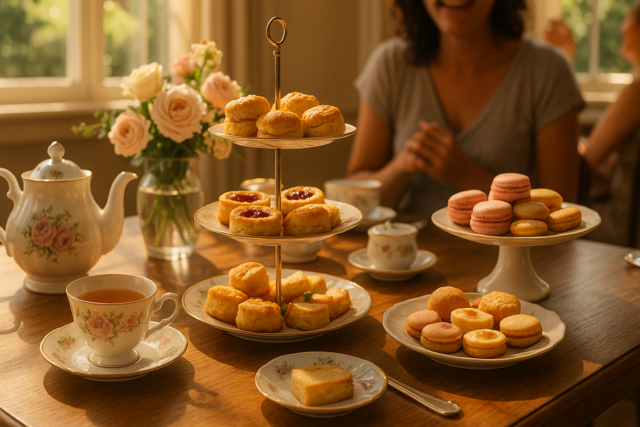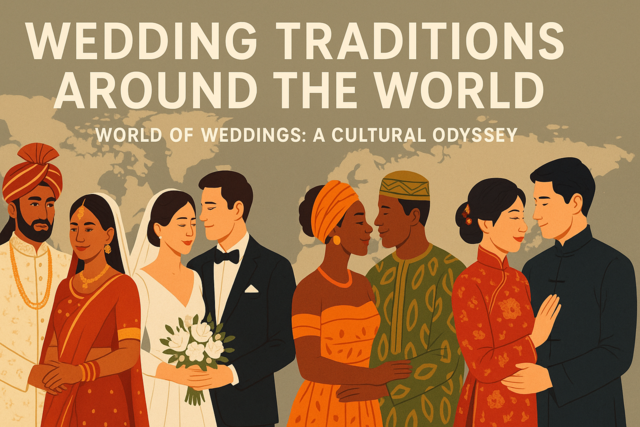| What Is Event Planning? |
B) A significant happening or occurrence.
C) A social gathering or activity.
No, this is not a multiple choice question.
|
Therefore, one who plans events is the individual who puts together everything for a gathering or activity of some significance. This can be anything from a first birthday party to a worldwide convention for a huge product launch. Two such events are actually more similar than one might suspect. What do all events have in common? That is a very good question because some are festive, special occasions. Others are focused on a particular business purpose. Some last hours. Some last days. The fact is, no matter what the size of the event, the common denominator is that someone spent a lot of time, effort, and resources to create it, to design it, and to organize it. No event comes off without someone in charge, directing every minute detail, ensuring that everything is planned. |
Corporate:
-
Meetings
-
Trainings
-
Fundraising
-
Conventions
Social:
-
Celebrations
-
Rites of passage
-
Family events
Regardless of the type of event, an event planner does very similar work for all events.
| The Job of an Event Planner |
The facts, however, cast a very different light on the occupation. Most of an event planner's duties are done behind the scenes: talking to clients on the phone, checking out potential vendors, creating and reviewing contracts, preparing timelines for upcoming events, marketing for and contracting with new businesses, investigating new venues, or shopping for deals on items such as vases, candlestick holders, and other various items.
Event or meeting planners coordinate everything necessary to put together an event that will be memorable, meet the criteria of purpose, be well organized, and achieve everything within a budget. Some event planners work on smaller events, while others work with a team of people putting on very large events, ongoing events, or annual events.
My mother-in-law would have made a good event planner. Every family holiday, she would scour magazines for months ahead, looking for menu and decorating ideas. She would clip the pictures and recipes and put them in a three-ring binder. As the date approached, she would narrow everything down, creating an elaborate menu and decorating scheme. With those decisions made, she would then make lists: lists for food, lists for flowers, lists for decorations, and then lists for when everything needs to be done, creating what is known in the business as a "timeline."
In the special event business, timelines are the lifeblood of the business. Without them, nothing would be done on time or in the proper order. Each event would have various timelines, the first one well ahead of the event.
As the event draws nearer, the timelines become more and more specific. The final timeline occurs on the day of the event itself, with everything scheduled down to the hour and minute. All of this is done with the greatest attention to detail.
Not everyone has the same skills as my mother-in-law. The people who do not would need an event planner. Perhaps you have a similar set of skills and are interested in becoming an event planner.
Duties of an Event Planner:
-
Consult with clients.
-
Set budgets.
-
Select dates.
-
Choose and inspect venues or locations.
-
Negotiate with and select vendors and suppliers.
-
Arrange transportation.
-
Arrange for food and beverage service or catering.
-
Book blocks of rooms.
-
Book speakers and entertainers.
-
Write publicity pieces.
-
Put together participant packets.
-
Ship boxes.
-
Solicit help from and direct volunteers.
-
Prepare invitations, select printers, compile invitations, and send them.
-
Create agendas.
-
Negotiate room rates.
-
Write brochure copy.
-
Enter information into a database.
-
Interact with chief executive officers, general managers, wait staff, caterers, vendors, housekeepers, and everyone in between.
-
Perform any task necessary to make the event a success..
| Important Characteristics of a Successful Event Planner |
Without exception, the characteristics of an event planner include all of the following attributes:
-
people skills;
-
organizational skills;Want to learn more? Take an online course in Special Events Planning.
-
networking skills;
-
knowledge of and training in the field;
-
versatility;
-
leadership;
-
team-building capabilities;
-
calm demeanor under stress;
-
sociability;
-
friendliness;
-
efficiency;
-
creativity.
| How to Prepare Yourself for a Career in Event Planning |
There are many ways to get into the field of event planning. There are college training programs in the hospitality industry that can prepare you for specialized work that may eventually bring you to event planning.
Most of the time, event planners are created. You may have a great desire to plan things. Perhaps you planned your own wedding or the wedding of a friend. Still others got into event planning by working for a nonprofit organization or by catering banquet events. As you work in this manner, you get to know the people you need to know, you begin to network, finding suppliers and vendors. The vast majority of event planners have experience in catering or banquet functions because food almost always is the backbone of an event. Understanding the flow of food, how it is prepared, presented, and planned for, will help you to prepare for such a career. It actually is a good idea to work in a field very close to event planning, or even enter a mentoring program in which you will work with an experienced event planner, until you understand the job.
| Specializing: How to Find Your Niche |
| Is This Job for You? |
If you are the one who rushes to take over organizing anything, from the bake sale at church to the annual summer office picnic at the zoo, you may very well be suited for this job. Evaluate your skills by answering the following questions as honestly and thoughtfully as you can:
-
Are you willing to give up evenings and weekends to run and promote your business?
-
How much time are you willing or able to give to your business?
-
How much support do you have from your family?
-
Are you organized? Can you keep the smallest details straight?
-
How much of a people person are you? Can you listen to someone, really hear what they want or need, without interjecting your personal opinion?
-
How are you with stress?
-
How do you handle a crisis?
-
Are you creative?
-
Can you listen to someone who is just venting without giving advice?
-
How well do you work with other people?
-
Are you a good leader? Can you create a good and cooperative team?
-
Do you want this job for the glamour? If so, stop here. This job is anything but glamorous.
The following two questions are pertinent if you intend to go solo immediately:
-
Where will you get the money to finance a new business?
-
Are you willing and able to work for almost nothing until your business is established?
| Planning an Event Is a Lot of Work |
The average wedding takes approximately 240 hours to plan. That works out to be about six 40-hour work weeks. That said, it is pretty obvious that most people are not fortunate enough to quit their day jobs when planning an event, so they look to the professionals.
For this section, we will refer to the movie What Happens in Vegas(2008), in which Cameron Diaz as main character Joy McNally hooks up with Ashton Kutcher in the role of Jack Fuller. Joy believes she is very interested in climbing the ladder at work and agrees to attend the company retreat with her new husband.
The company retreat is hosted by Joy's boss, Richard Banger. On first viewing the movie, it appears that Mr. Banger is very wealthy; he lives in a gorgeous mansion with unbelievably beautiful grounds complete with ponds, and he has an amazing staff that puts together his company's retreat.
The first scene at the weekend retreat is an outdoor luncheon. For this event, viewers may note the following:
-
floral arrangements for tables and on the ground;
-
tents and umbrellas for shade;
-
tables and chairs for sitting;
-
tables for food and drink service;
-
live band;
-
tablecloths, napkins, and other assorted linens;
-
plates, glassware, and silverware;
-
caterer;
-
wait staff for food and beverage service;
-
behind-the-scenes transportation and parking;
-
behind-the-scenes setup and cleanup crews.
The next event is the team-building bicycle polo event. Just for starters, the event planner had to plan for the following:
-
bicycles;
-
helmets;
-
team T-shirts;
-
polo equipment;
-
gathering permits;
-
field or venue reservations;
-
insurance against injury or damage;
-
behind-the-scenes setup and cleanup crews.
-
decorations that include 5-foot playing cards arranged in hands of poker, giant dice, and star-spangled draperies for backdrops, among other things.
- tables and chairs. (It could be argued that these were the same as those used outside earlier in the day, but someone had to move them inside and arrange them in a banquet style).
- different floral arrangements from those used outside.
- more food and beverages.
- alcohol license issues.
- plates, glassware, and silverware.
- bartenders.
- wait staff.
- dance floor.
- live music.
-
audio-visual equipment.
-
nametags.
-
transportation from the daytime activities to the evening activities.
-
behind-the-scenes setup and cleanup crews.
-
more insurance issues.
Last of all, the guests all had to have overnight accommodations. Someone had to make arrangements for everyone in attendance at the weekend retreat to have suitable room accommodations.
All that was seen in just about the blink of an eye. Think back to the last event you attended, whether it was a science fair, a wedding, fundraising walk-a-thon, or product launch. Everything that took place at those events was facilitated by an event planner.
Needs: It Is all about What the Client Needs or Wants
As soon as an event is considered, the person who intends to host it will have a vision or a desired result. You, as the event planner, must be able to elicit the necessary information to give your client exactly what he or she desires. The vision is the main reason or focus for hosting the event. There will be a combination of goals and objectives.
These goals and objectives may not be defined up front, so you have to dig and probe in your interview with your client to determine what they are. Bigger events have more complex and intricate goals and objectives. Smaller events usually are more obvious.
| Interpret and Deliver |
Richard K. is a former catering manager at a Doubletree Hotel in Phoenix, Arizona. According to Richard, his job entailed listening to what the client wanted and figuring out how to deliver it. According to Richard, the hallmark of a good event manager is to ask himself, "How can I do that?" rather than tell himself, "Oh, I can't do that."
It is so much more than the "fine-line planning" that involves the setup, whether there is to be music or not, dance floor, table linens, color scheme, place settings, service style. You have to listen to what the client wants in terms of atmosphere, in terms of "how high a touch" the client wants. A "high touch" event is one where the guests are waited on hand and foot.
According to Richard, some clients wish to be treated like royalty, and expect you to plan and do absolutely everything for them and their guests. In the industry, it often is referred to as a "royalty whim," in which the client has a vision of service suitable for royalty.
Other clients would prefer to have you spend a lot of their budgetary resources on atmosphere. There was a Tucson premiere of the Star Wars movie, and the entire ballroom was turned into an ice cave provided by a local theatrical company. It was complete with industrial-sized fog machines. The pool was transformed into a swamp, with 1/5 scale model of the X-wing that movie character Luke Skywalker flew and that sank halfway into the swamp.
"My job is to delight and surprise my client while somehow staying realistic. A good event planner has the technical resources for lighting, special effects, artifacts. I have to build on a team of vendors and we ask ourselves, 'Is there a way to do this?' before we deny a client's request." On this point, Richard is adamant. Just because it has not been done before does not mean you should not try. It just means you have to work a little harder to get it done.
| The Formula |
The only formula for success that makes any sense has been presented by Brian Tracy, an impressive, worldwide success trainer who says that the best way to become rated in the top 5 percent of your field is to set out, for the next five years, to read 10 pages of a good business book every day, listen to 30 minutes of a great business-related or personal development compact disc (CD) every day, and participate in one class per quarter in your chosen business-related field. Then, apply what you learn and, over the next five years, you would find yourself in the top 5 percent of event planners.
For you, that would mean expanding your knowledge about the field of event planning by reading books on business, personal development, customer service, and people skills. Find CDs or podcasts that you can listen to about various business practices, people skills, or personal development.
Make it a point to attend one event per quarter that will give you a better understanding of your business and your place in it.
One designer interviewed listed the things she has done recently to improve her business:
-
Attended a blogging seminar.
-
Set up a new blog on her website.
- Attended a design course in New York put on by a world-famous designer.
-
Read business books and magazines, and took clips to add to her personal notebook for future reference.
-
Networked with other designers and planners.
-
Participated in local vendor conventions.
- Actively marketed her business.
| The Planning Process |
Q: Take me through an event. Do clients have the idea, or do you come up with the idea? Tell me about that.
C: It's all very subjective because events are ever-changing. It all depends on the moment in their life that they're looking to celebrate and it all has a lot to do with the client's personality, too. Some of them are micromanaging, and others just want me to come with a design and at the end of the day they'll just write me a check. It's all very, very different. I really have to sit down and have a consultation with them where I can determine if I'm even a match for them. We have to make sure that our personalities are going to connect because they're getting ready to invest several thousands, if not tens of thousands, if not hundreds of thousands [of dollars], into an event�. We have to be able to like each other. It is something that I have to measure, almost with my mind and my spirit, to be able to take a look at their wants, desires, and then look at their budget. It is up to me to determine whether we can do what they want, and I also need to know how they want me to be involved. A lot of it is just a big part of it that is communication and then just going from there. How involved they want to be and how involved they want me to be.
Q: Do they have to know this, or do you elicit this information from them? I'm sure you are probably very good at that consultation, but how do you get those sorts of answers? Some of it you can intuit, but how do you find out? Do you come right out and say, "How much are you going to spend?"
C: It is not a regulated industry�. People do what works for them. Planners do things differently. I try to feel out a lot of it�merely on my assumptions, showing them my portfolio that I have done and that way they can see where we are at as far as budgets�This way I can see if they are looking toward the higher end, medium, and then the lower end. I also have people who work with me, and if the client is not a match for me, then I can refer them to one of my junior consultants. Basically, I don't feel that it is any of my business initially�in regards to what I do for services�to ask them, "What's your bottom line?" without me having a contract signed with them. I feel that is very personal, intrusive, and I think because we live in such a world by how much we spend that I don't want to know what they can spend until we know if they are comfortable with hiring me. We have to like each other, whether they want to spend $10,000 on an event or if they intend to spend $150,000 on an event.
Q: They will come to you with an idea and say I want to do ____ for this event, and then you say, "What's your vision?" How do you get that?
C: You have to ask questions, like "What types of foods are you looking for?" or "Talk to me about your ambience�are you thinking a DJ or a band?" Obviously a band is going to be much more expensive than the DJ. If they say, "I saw Stevie Wonder in Las Vegas and I want to fly him in," automatically we know that this is going to be a higher end budget�. Or maybe they might drop hints like, "I want to have this conference at the Fairmont Scottsdale Princess, as opposed to the Airport Hilton." I'm going to know from this information, from listening to them and being intuitive and finding out where they're from, what they do for a living, and going from there. Does this help?
Q: It does. I was just thinking: Someone just walks in off the street. I'm sure you have a preliminary meeting or consultation with them�over the phone, is this correct?
C: Absolutely.
Q: When they contact you, they send you an e-mail, they give you a phone call, say that they were referred to you, and I'd like to talk to you. Do people shop around for this kind of service?
C: I would say that they talk about shopping around, but most probably do not. When I speak to someone specifically and decide to move forward with a consultation, typically, if it is meant to be, they are pretty enthusiastic about it from the get-go. I always encourage people to shop around and have no qualms about giving out a list of other event planners who I feel are on the level of service that I give. I want apples to be compared to apples, versus apples to lemons. I explain to them that I'm not the most expensive, but I'm certainly not the least expensive. Most importantly, you have to find someone you'd like to work with because you're getting ready to have this big relationship with them.
Q: You have a portfolio. Do you have pictures? Menu ideas? What's included in your portfolio?
C: I do have a media portfolio, it is all of my prints that I've done, if I've won awards, my accolades, advertising, things that I've invested in because that gives me a sense of authenticity, that I'm a real company. With this business, it is so easy to call yourself an event planner, so if people look at me, see that I've done things, see that I've invested in myself, I'm accredited in the industry and recognized, then it gives me credibility so they can trust me and believe that I am worthwhile. I used to have a big portfolio of pictures, and I do go back and forth on that, but the moment you print the picture, it is outdated. It is something that is ever-evolving with design and such, so I really try to move forward with looking at what their event style is and possibly e-mailing them pictures that are similar to what they are looking at�showing them an event I've done, rather than constantly printing out pictures because honestly I have thousands and thousands of images, and it is just not earth-friendly to be constantly printing those out.
Q: It might be too time-consuming then to look at everything you have done in the past. It sounds as though you would rather get an idea then of what they are looking at before you even start opening up the discussion about what types of things that you do.
C: It has to be all about them. Then I have to figure out how I can come in and, as corny as it sounds, it is my job to make their dream, their vision a reality. Really, I have to put a design aspect to it. They need someone who knows what they are doing�and all of my clients have said that I'm the best investment they have made out of the whole experience. This is because they have been through the experience of what we give them. Did they know this at the beginning? Of course not. I don't have to strong-arm, but some of them need more convincing that they need an event planner. Some of them think that they can do it, but I know that they don't really know what they are about to get into. Once they get it, they know that they made a good choice, because they do not have the time needed to do everything.
Q: Do you find yourself having to convince someone to hire you or do you just let them make that choice?
C: I think it is both. I think that they hear it, specifically with brides, they hear that they probably at least need a "day-of" coordinator, or "I want full-planning"�but they then have to convince their business partner, or their "better half," or "why can't our HR girls do it?" �sometimes I tend to have to convince them, especially if they have never had any experience doing this type of work. Once we walk through the packages, then they see all the details that we take care of, it is not so hard to close the deal. It's a matter of demonstrating the value of our service. Once they get that, they're usually happy to sign a contract.






















